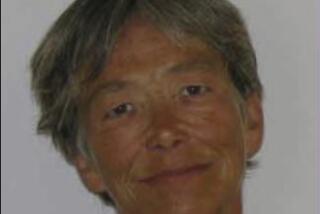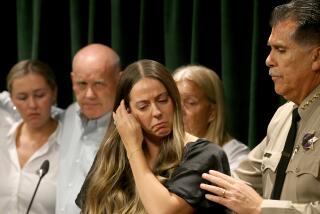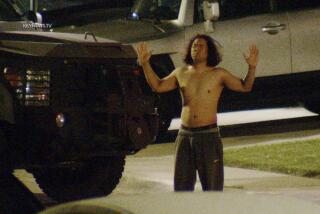92-Year-Old Defendant Doesn’t Deserve Sympathy, Jury Is Told
- Share via
Despite testimony that Alfred Pohlmeier was a gentle man driven to the brink by his wife’s illness, a prosecutor urged a Ventura County jury Monday to feel no sympathy for the 92-year-old Fillmore man and to convict him of first-degree murder for strangling his wife.
“What he did was wrong and he should be held accountable,” Deputy Dist. Atty. Donald C. Glynn said of Pohlmeier, the oldest defendant in county history.
In his closing arguments, Glynn told the jury that Pohlmeier betrayed his wife of 62 years when he choked her to death Sept. 13, 1995, because of her chronic coughing. And he took issue with a defense theory that the slaying of 86-year-old Lidwina Pohlmeier was a “misguided act of love” to end her discomfort.
“This is not a mercy killing,” Glynn argued. “This was an unlawful killing.”
But in her closing arguments, Deputy Public Defender Susan Olson urged the 12-member panel to acquit Pohlmeier of murder or choose a lesser verdict of voluntary manslaughter.
Olson argued that Pohlmeier did not premeditate his wife’s slaying and therefore cannot be found guilty of first-degree murder.
“You have exactly zero evidence of any planning,” Olson said, adding that it is “entirely improbable that a man like Mr. Pohlmeier could plot his wife’s death.”
She pointed to the testimony of Pohlmeier’s adult children and neighbors, who described him as a gentle man devoted to his wife, even during her declining health.
Olson told the jury that on the morning of Sept. 13, Pohlmeier was exhausted from lack of sleep and stress caused by years of caring for Lidwina. When her coughing began, Olson said, Pohlmeier “snapped” and in a moment of despair choked his wife to death.
As the jury listened intently, Pohlmeier, dressed in a steel-blue suit, sat in his wheelchair and stared down at the defense table. He made no eye contact with jurors or lawyers during the day but turned to look at his family a few times during court recesses.
At one point, Pohlmeier closed his eyes for several minutes as Olson recounted a series of statements he made to authorities after the slaying. Seated in the courtroom gallery behind him, Pohlmeier’s daughters wept softly as Olson talked about a remark Pohlmeier made about wanting to be buried alongside his wife.
Earlier in the day, Glynn told the jury that it may be difficult to cast aside feelings of sympathy for the frail-looking defendant, but reminded jurors of promises they made not to allow Pohlmeier’s age to influence their decision.
*
To illustrate his point, Glynn held up a poster board with pictures of Pohlmeier and his wife at their 50th wedding anniversary in which the couple looks happy and in love.
“But ladies and gentlemen, don’t forget this picture,” Glynn said, holding a photograph of a bruised and brain-dead Lidwina taken at Santa Paula Hospital after her attack. “Do not let sympathy obscure your view of the evidence.”
Glynn also told the jury not to consider what penalty Pohlmeier may face if convicted, and not to consider Pohlmeier’s sanity at the time of the killing.
The defense contends that Pohlmeier was suffering from temporary insanity, but the jury has not heard any evidence about that. If Pohlmeier is convicted of either murder or manslaughter, a second sanity phase of the trial will be held.
During the two-week murder trial, the jury learned that Pohlmeier, a retired postal worker originally from Texas, had become the primary caregiver for his wife.
As her health declined, she developed a chronic cough and a choking sensation in her throat that caused her to go to the hospital emergency room four times in the months before her death, according to witnesses.
Pohlmeier tried to ease Lidwina’s cough by giving her Popsicles and painkillers, according to court testimony. He and his son, Joseph of Simi Valley, took Lidwina to three doctors a week before her death to determine whether the cough was treatable. But the doctors said there was no apparent cause for the cough, witnesses said.
During the proceedings, Glynn played taped interviews that Pohlmeier gave authorities after killing his wife. In those, Pohlmeier explains that her coughing was driving him “nuts.” He also says that he had been thinking about killing her for a “couple of days.”
*
During his final argument, Glynn pointed to those statements as evidence of motive and premeditation.
But Olson argued that if Pohlmeier had really intended to kill his wife, he would not have done it in such a rash and violent manner. The fact that he strangled her, Olson suggested, shows that he did not think about his actions beforehand but simply snapped.
The jury began deliberations late Monday afternoon and is expected to continue today.
More to Read
Sign up for Essential California
The most important California stories and recommendations in your inbox every morning.
You may occasionally receive promotional content from the Los Angeles Times.










